Filteredwaterguide.com is supported by readers. If you purchase through referral links on our site, we make a commission at no extra cost to you. Learn more.
The market for water filters seems to be growing year on year, with more and more brands and types of water filters available.
New features are constantly being released as manufacturers compete for customers and it can be hard to tell the different products apart.
We have put together a list of the different types of water filters to make it easier for you to establish which filter type will work best for you.

A popular option in many different types of water treatment units – Activated Carbon filters are excellent at removing larger particles, such as sediments, rust and organic compounds from the water supply.
These filters are blocks of compressed carbon and the large surface area of the tiny particles which make up the tightly pressed block is full of small pores, which trap particles within the water as they pass through. This allows water to run through the filter without taking the contaminants too.
Reverse Osmosis water filters are one of the most effective filtering solutions, in terms of the sheer volume of contaminants which can be removed from the feed water – up to 99.99% of Total Dissolved Solids!
The feed water is pressurized and forced through a semi-permeable membrane, which allows the water molecules to pass through but not contaminants. This leaves fresh water to one side of the membrane and concentrated wastewater on the other, which is flushed to drain along with the impurities.
These units can be installed beneath a kitchen sink with relative ease, require very little maintenance and are often paired with UV filtration units to eliminate all bacteria and contaminants from a water supply.
These filters use electrolysis to separate the feed water into two streams according to the molecular charge of the particles within the supply.
When the water passes across electrically charged plates, molecules with a negative charge are drawn to the anode and positively charged molecules are drawn to the cathode. These charges dictate whether the water is more acidic or alkaline, and many believe that the latter has health benefits.
Alkaline water is also softer than acidic water and so water ionizers can be used in hard water areas to help with the effects of scale in plumbing systems.
Ultraviolet is a fairly new water filtration method and is extremely effective at destroying bacteria and parasites within the feed water.
Water is irradiated with UV light through a glass element, resulting in the death of living organisms within the supply.
UV filters require no chemicals and minimal maintenance.
Far Infrared (FIR) water filters also affect the molecular charge of the water passing through (as water ionizers do), resulting in softer, alkaline water being produced.
These filters are, as the name suggests, made of ceramic full of tiny pores. Water can run through the filter but contaminant particles are trapped within the tiny pores and removed from the filtered water which passes through.
These are often treated with antimicrobial agents to eliminate bacteria from the water as well.
They are one of the longest-lasting water filter cartridge types, as they can be removed and washed before being reused.
Water distillation is the oldest known type of water purification and is still used all over the world to improve the quality of drinking water supplies and remove impurities. It is even used to desalinate seawater to make it drinkable.
The distillation process involves the supply-water being boiled – the steam produced is trapped and condensed back into liquid form to give a purer product than was originally treated.
As it is only the water that evaporates to become steam during this process, contaminants are left behind. As the water must be heated to over 200 degrees Fahrenheit to evaporate, almost all bacteria and parasites are killed during this process as well.
In a household environment, distillation is usually used to purify small batches of water for
Activated Alumina filters are made up of aluminum oxide, the same material as precious stones such as ruby and sapphire.
Tiny pores within the molecular construction of the stone trap impurities suspended within the water, preventing them from passing through the filter.
The result is purer water from the faucet.
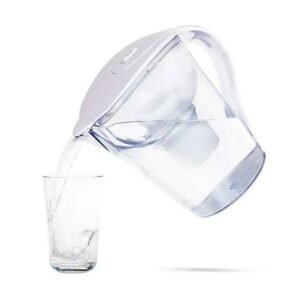
Water filter pitchers are a brilliantly convenient way to filter water at home. Small enough to fit in the refrigerator, these can be filled up as the filtered water is required so you use no more than you need. Water filter pitchers are cheap to buy outright and replacement filters are affordable too and widely available.
Although this filtration process is entirely manual, water filter pitchers always rate very highly in domestic water filter comparisons because of their ease of use and convenience.
When you need to filter small amounts for drinking, pitcher filters are a great option.
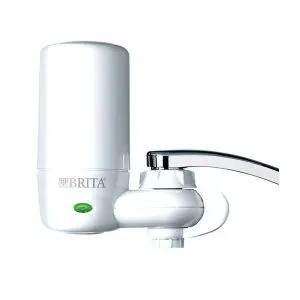
Faucet water filters are another highly affordable way to filter incoming tap water without having to invest in an expensive and complicated whole house water filtration system.
Very easy to fit, almost all big-brand faucet-mounted water filters come with adaptors to suit a variety of taps and they install directly onto the faucet. There is usually an option to turn the tap on for main supply water or filtered water to increase the longevity of your filter cartridge. Styles are available to blend in or stand out in any kitchen depending on your taste.
Faucet filters are a great option when you’re looking for affordable filtration to one outlet, without having to make serious changes to the plumbing.

Exactly as the name suggests, a shower head water filter attaches to the outlet on your shower and filters water at the point of use.
These are especially popular in hard water areas, where the minerals within the water supply can accumulate in hair, causing a dull look and dryness of the scalp. They can also build up on the skin and contribute to skin conditions.
By installing the filter at the outlet, the unit only treats the water used which makes them very effective at minimizing wastage, and it is very straight-forward to replace the filters at the end of their life.
Showerhead filters are perfect if you’re concerned about the effects of hard water on your hair and skin, and are an easy way to tell if the water from your shower is making a difference to your appearance.
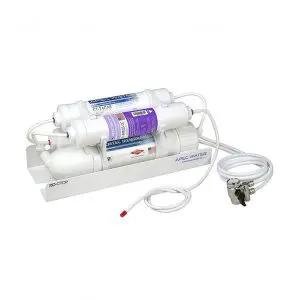
Countertop water filters are a simple way to provide purified water without having to make extensive changes to the plumbing within your home.
Suitable for connection to the water supply next to the kitchen or utility room sink, these units act as an additional water outlet to the faucet installed and can drain into the sink bowl making them very natural to operate.
Being surface-mounted, they are easily accessible which makes maintaining these filters far simpler than some under-sink varieties.
Different models offer a range of flow rates so there will almost certainly be a countertop water filter which meets your needs, whether you are looking for the occasional filtration of drinking water or wanting to filter the majority of water being used in one area without making serious changes to the property’s services.
Countertop water filters are best for people looking for a semi-permanent water filtration option for drinking from.
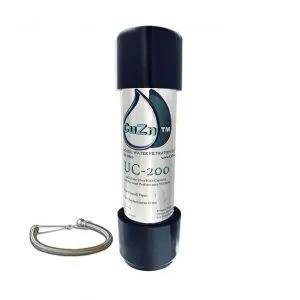
Undersink water filters are a very effective solution to poor water quality and taste, without having to invest the same sums of money as you would with a whole house filtration system.
Although no filtration process is as dependable as Reverse Osmosis (RO) for removing the highest quantities of total dissolved solids and other contaminants, under sink filters do not produce wastewater, have impressively high flow rates compared to RO systems and do not require a dedicated storage tank within the sink unit.
As with other filter types discussed above, the installation of these units is very straightforward and is simple enough to be carried out by most homeowners with the willingness to take on DIY.
Under Sink filters are perfect for people looking for a more permanent option than a faucet filter without investing in whole house filtration.
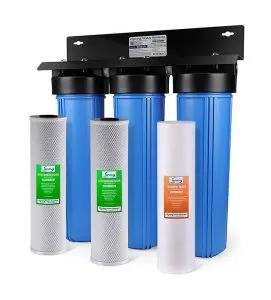
A whole house water filtration system is without a doubt the most thorough and comprehensive way to ensure that all of the water used within your home is filtered.
A whole house water filtration system connects directly to the incoming water supply pipe and will purify all of the water which enters for use within the property.
These systems are the most expensive to buy and many people lack the tools, technical knowledge and confidence to undertake such a large project in the home which means a professional plumber will usually be required to connect and commission the system.
Whole house filtration systems are often installed alongside water softeners to ensure that all of the pipework and storage tanks within the home are protected from scale as well as ensuring the highest water quality.
Whole house filtration is the best option when you’re looking for toal water purification for your home, and cost is a secondary factor to water quality.
Water filtration is a hot topic currently and the growing demand from homeowners and tenants for domestic water filtration solutions means that it is very likely manufacturers will keep improving and refining their products to add more features, reduce costs and improve efficiencies.
Remember that this article focuses on filters for use within the home and not types of commercial water filter, which need to be designed especially for the application and ought to be specified and fitted by a specialist contractor.
This guide should have given you a brief overview of the types of water filter available for use and installation within the home – check out our Review Guides of the different water filter types for in-depth assessments of various models in these categories, to help you decide which filter is right for you.
© 2024 Filtered Water Guide. All rights reserved.